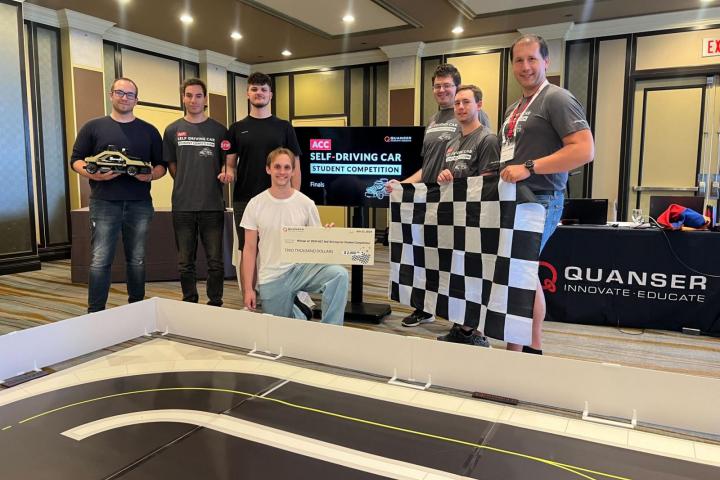
The team, called 2 Fast 2 Driverless, made up entirely of students from the Cybernetics and Robotics program at CTU, advanced to the top 12 out of more than 60 participating universities. In Denver, they will compete against rivals from renowned universities such as the Massachusetts Institute of Technology (MIT), Tsinghua University in China, and the University of Ottawa, where the QCar system was developed.
The competition aims to develop a control system for an autonomous vehicle that can navigate a given route without any external intervention while transporting as many taxi passengers as possible. Other evaluation criteria include driving safety and timely responses to traffic signs, as there are traffic lights and signs along the route.
Students had to implement functions such as merging data from individual car sensors, designing car dynamics and route guidance, trajectory planning, and image processing systems for detecting obstacles, traffic lights, and road signs. The system itself was then implemented on a 1:10 scale model vehicle.
“This year's assignment is significantly more demanding than last year's. Dynamic obstacles have been added, route planning decisions are more complex, and traffic lights and signs must be recognized in changing light conditions,” says team leader Tomáš Haniš from the Department of Control Engineering at FEE CTU. “Thanks to the new version of the vehicle model with a more powerful NVIDIA Jetson AGX Orin unit, we can process image inputs directly on board the vehicle, which allows us to expand its functions and respond more quickly.”
The competition takes place on a standardized model of the city, which the students physically transferred to the FEE classroom on Karlovo náměstí on a scale of one to one. They also use a digital twin, which they used to fine-tune the algorithms to perfection in a safe virtual environment before deploying them on the real model. The team itself consists of Kateřina Hobzová, Jakub Macar, Otakar Kodytek, Jan Kohout, Martin Jeřábek, Ondřej Kuban, and PhD student Jan Švancar, who acts as captain. “Each area – control, planning, and visual perception – is covered by two students so that they can collaborate and stand in for each other,” adds Haniš.
Last year's victory in the competition not only brought FEE prestige but also access to teaching materials and simulators. This has led to the development of other student projects. Although half of the team has changed this year, the “veterans” – Jan Švancar and three of last year's finalists – have passed on their experience.
About the 2025 ACC Self-Driving Car Student Competition
The ACC Self-Driving Car Student Competition is a prestigious international competition held as part of the American Control Conference (ACC). This year, it will take place from July 8 to 10, 2025, in Denver, Colorado, USA. The task for student teams is to design, build, and demonstrate the capabilities of an autonomous vehicle – this year in the role of an autonomous taxi. The vehicle must serve as many customers as possible within a limited time. Teams plan routes between pick-up and drop-off points, respond to traffic situations, obey traffic rules, and receive ratings and “profits” based on their performance. The goal is to earn as much virtual money as possible during several trips.
The participation of the CTU FEE student team in the competition was supported by Valeo.